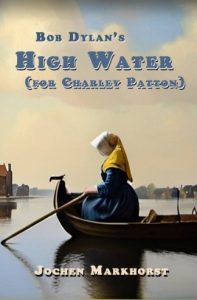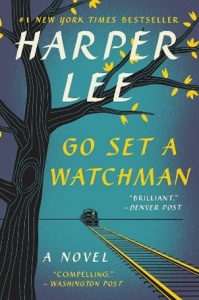Water’s gonna overflow
 “Maybe you noticed that most of my songs are traditionally rooted. I don’t do that on purpose. Charley Patton’s 30’s blues has made a deep impression on me and High Water (for Charley Patton) is, in my opinion, the best song of this record,” says Dylan at the Rome press conference, July 2001.
“Maybe you noticed that most of my songs are traditionally rooted. I don’t do that on purpose. Charley Patton’s 30’s blues has made a deep impression on me and High Water (for Charley Patton) is, in my opinion, the best song of this record,” says Dylan at the Rome press conference, July 2001.
I do agree. Well, ex aequo with “Mississippi”, anyway. Both songs open the floodgates (no pun intended), and “High Water” belongs in the same outer category as “Desolation Row”, “Mississippi” and “I Contain Multitudes”; extremely rich, poetic, Nobel Prize-worthy musical gems. Lovely, lovely song.
High Water (for Charley Patton) (2001) part 20
by Jochen Markhorst
XX Odds and ends
 A fascinating dilemma for Duluth’s peace officers and law keepers if today or tomorrow a complaint comes in about the city’s most famous son. It’s plain as day though; Dylan does indeed sing the n-word. “The Negro’s name is used” in “Only A Pawn In Their Game” (The Times They Are A-Changin’, 1964) and eleven years later even a degree stronger in “Hurricane”: To the black folks he was just a crazy nigger. Unthinkable it is not, such a complaint. In 2019, Duluth school district administrators decide to remove Harper Lee’s novel To Kill A Mockingbird and Mark Twain’s Adventures Of Huckleberry Finn from the curriculum “to protect the dignity of our students” and not require them to read books that marginalise them. Duluth is not alone herein; in the twenty-first century alone, the tally stands at over 20 school districts where Harper Lee’s pièce de résistance is being removed from reading lists plus dozens of attempts to do so. And usually complainants then invoke the perceived offensive use of the n-word. Like in Biloxi, Mississippi, where a concerned mother complains that her son feels “uncomfortable” with its use in Mockingbird – which, ironically, seems to be precisely the intention of Lee’s 1960 novel, the 1962 film version starring Gregory Peck and Aaron Sorkin’s 2018 stage adaptation.
A fascinating dilemma for Duluth’s peace officers and law keepers if today or tomorrow a complaint comes in about the city’s most famous son. It’s plain as day though; Dylan does indeed sing the n-word. “The Negro’s name is used” in “Only A Pawn In Their Game” (The Times They Are A-Changin’, 1964) and eleven years later even a degree stronger in “Hurricane”: To the black folks he was just a crazy nigger. Unthinkable it is not, such a complaint. In 2019, Duluth school district administrators decide to remove Harper Lee’s novel To Kill A Mockingbird and Mark Twain’s Adventures Of Huckleberry Finn from the curriculum “to protect the dignity of our students” and not require them to read books that marginalise them. Duluth is not alone herein; in the twenty-first century alone, the tally stands at over 20 school districts where Harper Lee’s pièce de résistance is being removed from reading lists plus dozens of attempts to do so. And usually complainants then invoke the perceived offensive use of the n-word. Like in Biloxi, Mississippi, where a concerned mother complains that her son feels “uncomfortable” with its use in Mockingbird – which, ironically, seems to be precisely the intention of Lee’s 1960 novel, the 1962 film version starring Gregory Peck and Aaron Sorkin’s 2018 stage adaptation.
Morrissey – Only a Pawn in Their Game:
The ongoing controversy gets a new boost in 2015, when publishers HarperCollins (US) and Heinemann (UK) release Harper Lee’s Go Set a Watchman, initially touted as “the sequel to To Kill A Mockingbird”. Excitement about this soon gives way to sobering; Go Set a Watchman turns out to be not so much a sequel as rather a kind of preliminary study – Harper Lee wrote the work before To Kill A Mockingbird. After constructive criticism from an apparently knowledgeable editor, Therese von Hohoff Torrey, Lee lifted out the flashback passages centered around young Scout, and rewrote them into what is now the classic. “Draft manuscript” is thus a more correct classification for Go Set a Watchman than “novel” or “sequel”.
It is perfectly common for fragments and passages from rejected manuscripts to be saved for reuse in a subsequent attempt or, indeed, for reuse in a subsequent, different work of art. Bach disregarded the eternal value of his vibrant Brandenburg Concertos and unconcernedly cut and copied from it for later cantatas and even an entire harpsichord concerto (BWV 1057). Haydn’s Schöpfungsmesse (Creation Mass, 1801) contains scraps originally intended for Die Schöpfung, Beethoven’s Eroica is recycled ballet music, and there are hundreds more examples.
From literati, novelists and poets, even from giants like T.S. Eliot and Kafka, we can observe how deleted fragments from first drafts are later recycled in subsequent works. Which gives admirers fascinating insights into the creation of works of art, and critics ammunition: after all, interchangeability and reuse do undermine the idea that those admired symphonies, poems, novels and song lyrics are self-enclosed, autonomous works of art.
We know plenty of examples in Dylan’s oeuvre as well. Thanks to the Bootleg Series, we discover how outtakes like “Marchin’ To The City” and “Dreamin’ Of You” are plundered to contribute half couplets and complete verse lines to “‘Til I Fell In Love With You” and “Not Dark Yet”, among others. And in 2022, we see that artifice when we get to peruse draft versions and loose notes via the archive in Tulsa. For instance, we decipher Got to believe that you’re alive, at least that’s what to tell yourself in the “James Joyce stanza”, a verse line that moves paraphrased to No 5 of Side A, to “Lonesome Day Blues”: I’m telling myself I’m still alive. And we see the mechanism on a micro level as well: the migration of word combinations and even single words to later songs.
Saturday Nite Fish Fry – Lonesome Day Blues:
The draft versions of “High Water”, both the published copies and the rejected verses published by authors like Clinton Heylin after visiting the archive, provide quite a few aha moments in this area. In The Double Life of Bob Dylan Volume 2: 1966-2021 (2023), Heylin quotes three more distichs that struck him. The first one looks familiar:
James Joyce left in the roaring rain Rode to Rosedale but they wouldn’t let him off the train
The second line we initially know as Got pulled in Vicksburg but they wouldn’t let him off the train (something like that, anyway) from the other draft version, but in the definitive version only “Vicksburg” survives. Rosedale, though mentioned in Charley Patton’s “High Water Everywhere”, we won’t see again in Dylan’s oeuvre, nor the claustrophobic train experience.
“James Joyce”, to whom Dylan previously tried to give a place, between the lines of what was once a third verse, disappears too. In that third verse from the draft, of which not a trace remains as it is, James already had a hard time: “James Joyce just walked in the door like he’d been in a whirlwind”. Deleted, but not entirely evaporated. James Joyce then makes his “grande” entrance into Dylan’s oeuvre eight years later, on Together Through Life in “I Feel A Change Comin’ On”. Well, actually not really “grande” and much less spectacular at that (“I’m hearing Billy Joe Shaver / And I’m reading James Joyce”), but still. The spectacular setting, the whirlwind, lingers a little longer in Dylan’s working memory, but eventually finds a place too: in “Tempest” (2012).
For that marathon song from the album of the same name, Dylan has apparently been browsing his “High Water” draft versions quite a bit. At least, we hear a remarkable amount of noticeable idiom that we really only encounter once in sixty years of Dylan songs:
– High Water draft: River banks are swelling
– Tempest: the swelling tide
– High Water draft: James Joyce just walked in the door like he’d been in a whirlwind
– Tempest: He walked into the whirlwind
– High Water draft: Livin’ there in the underworld
– Tempest: Into the underworld
– High Water draft: I’m looking as far to the East as the eye can see
– Tempest: He saw the starlight shining streaming from the East
and much more similarly in – again – “I Feel a Change Comin’ On”:
– Looking far off into the East
– High Water draft: in the dreadful hours of dawn
– Tempest: In the long and dreadful hours
Taken by itself, each fragment is too unremarkable to be classified as re-use, but after the fifth notice, the coincidence factor can pretty much be ruled out. As also, with the benefit of hindsight, that Got pulled in Vicksburg but they wouldn’t let him off the train line does sound very much like an echo of a rejected line from the alternative “Dignity” version on Tell Tale Signs: “Pull into the platform, step off the train”. According to Dylans’s own origination report written in January 1988, recorded – and rejected – during the Oh Mercy sessions in 1989. So a 13-year-old echo of the song that kept him writing for a day and a night, as he writes in Chronicles:
“There were more verses with other individuals in different interplays. The Green Beret, The Sorceress, Virgin Mary, The Wrong Man, Big Ben, and The Cripple and The Honkey. The list could be endless. All kinds of identifiable characters that found their way into the song but somehow didn’t survive.”
Other individuals and identifiable characters such as James Joyce, Joe Turner, Dr Frankenstein and Huckleberry Finn, one would be inclined to think. Some of whom then turn out, years later, to have survived after all. You got to believe that you’re alive, at least that’s what to tell yourself.
————
To be continued. Next up High Water (For Charley Patton) part 21: Dat first rate ballad
Jochen is a regular reviewer of Dylan’s work on Untold. His books, in English, Dutch and German, are available via Amazon both in paperback and on Kindle:
- Blood on the Tracks: Dylan’s Masterpiece in Blue
- Blonde On Blonde: Bob Dylan’s mercurial masterpiece
- Where Are You Tonight? Bob Dylan’s hushed-up classic from 1978
- Desolation Row: Bob Dylan’s poetic letter from 1965
- Basement Tapes: Bob Dylan’s Summer of 1967
- Mississippi: Bob Dylan’s midlife masterpiece
- Bob Dylan’s Greatest Hits
- John Wesley Harding: Bob Dylan meets Kafka in Nashville
- Tombstone Blues b/w Jet Pilot: Dylan’s lookin’ for the fuse
- Street-Legal: Bob Dylan’s unpolished gem from 1978
- Bringing It All Back Home: Bob Dylan’s 2nd Big Bang
- Time Out Of Mind: The Rising of an Old Master
- Crossing The Rubicon: Dylan’s latter-day classic
- Nashville Skyline: Bob Dylan’s other type of music
- Nick Drake’s River Man: A very British Masterpiece
- I Contain Multitudes: Bob Dylan’s Account of the Long Strange Trip
- Bob Dylan’s Rough And Rowdy Ways – Side B
- Bob Dylan’s High Water (for Charley Patton)
